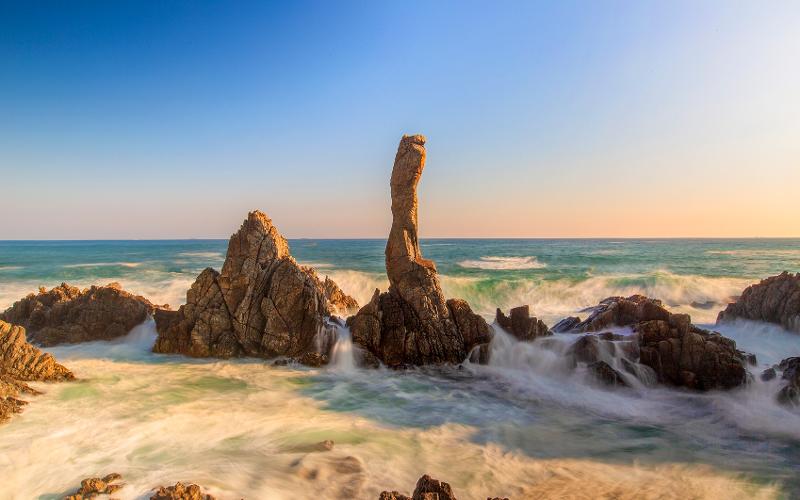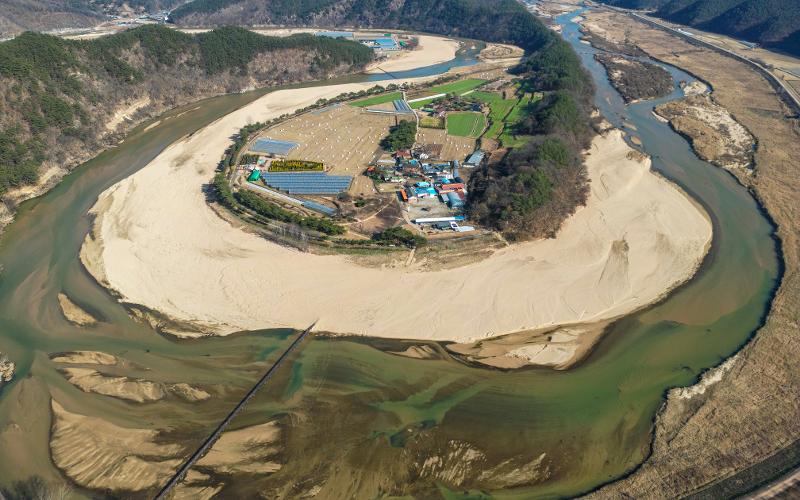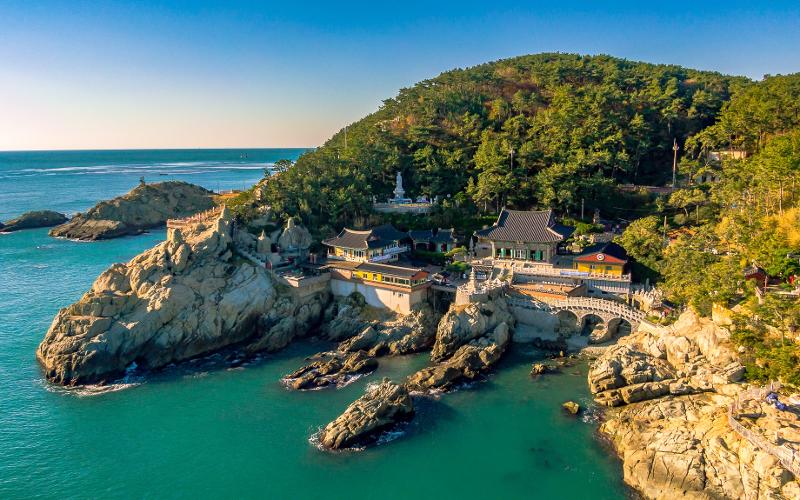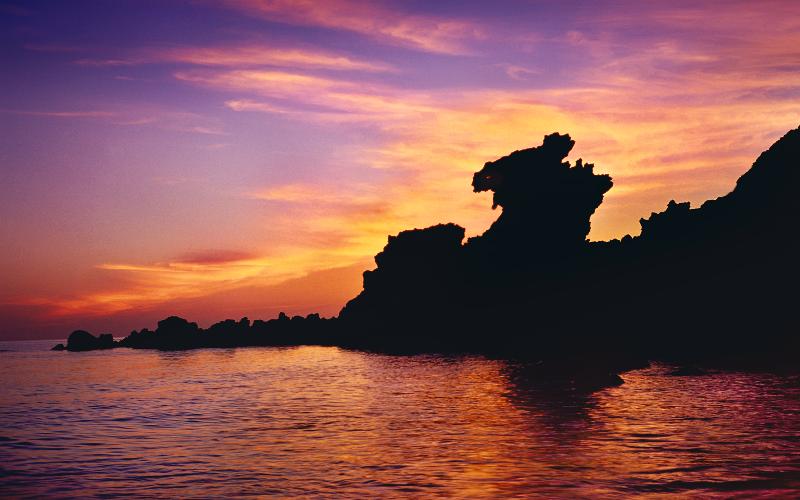2024년 갑진년은 푸른 용의 해다. 코리아넷은 올해 가보면 좋을 용과 관련된 주요 여행지를 소개한다. 2024 is gabjinnyeon, or the Year of the Blue Dragon under the Asian zodiac. Korea.net recommends visiting this year the following five tourist attractions related to dragons.

▲ 강원 삼척시 초곡용굴촛대바위길에서 바라본 촛대바위. This is Chuam Chotdaebawi Rock as seen from Chogok Yonggul Chotdae Bawigil Trail in Samcheok, Gangwon-do Province. (Samcheok City Hall's official website - 삼척시 관광 누리집)
아름다운 해변과 일출로 유명한 강원 삼척시에는 초곡용굴촛대바위길이 있다. 촛대바위부터 5분 가량 데크길을 걷다보면 거북바위, 사자바위, 용굴 등 독특한 지형과 해안 절경을 마주할 수 있다. 작은 낚시배가 지나갈 수 있는 용굴은 구렁이가 용으로 승천한 장소라는 전설을 갖고 있는 곳이다.
Samcheok, Gangwon-do Province, a city renowned for its beautiful beaches and sunrise, is home to the Chogok Yonggul Chotdae Bawigil Trail. Walk along the path from Chuam Chotdaebawi (Candlestick) Rock for about five minutes to see the distinctive geographical features of Geobukbawi (Turtle) Rock, Sajabawi (Lion) Rock, and Yonggul (Dragon) Cave and the beautiful coastal scenery. Legend says the cave, where small fishing boats can pass through, is where a big snake transformed into a dragon and ascended to heaven.

▲ 경북 예천군 비룡산 전망대에서 바라본 회룡포 전경. This view of Hoeryongpo Village is from the observatory on Biryongsan Mountain in Yecheon-gun County, Gyeongsangbuk-do Province. (Korea Tourism Organization - 한국관광공사)
경북 예천군 회룡포는 낙동강 지류인 내성천이 마을을 휘감고 나가는 형상이 마치 용틀임하는 듯해 지어진 지명이다. 고도 240m의 비룡산 전망대에 오르면 육지 속 섬 마을의 모습을 한눈에 담을 수 있다. 주변에 용궁향교, 용궁역테마공원, 용궁순대 등 용과 관련된 볼거리와 먹거리가 다양하다.
Hoeryongpo Village in Yecheon-gun County, Gyeongsangbuk-do Province, got its name from the shape of the Neseongcheon Stream encircling the village which resembles a dragon twisting and turning. Climb to the observatory on Biryongsan Mountain, whose altitude is 240 m, to see the entire island village on land at a glance.
Near the mountain are many things to see and eat related to dragons including Yonggunghyanggyo (Dragon Palace Hyanggyo), with a hyanggyo being a government-run Confucian school in the provinces during the Goryeo and Joseon dynasties. Yonggung Station Theme Park and Yonggung sundae (blood sausage) are other highlights of this area.

▲ 부산 기장군에 위치한 해동용궁사 전경. Haedong Yonggungsa Temple in Busan's Gijang-gun County is located by the sea. (Korea Tourism Organization - 한국관광공사)
부산 기장군 해동용궁사는 용과 관련된 대표적인 사찰이다. 해동용궁사는 1376년 창건된 뒤 임진왜란 때 소실됐다가 1930년대 초 보문사로 다시 지어졌다. 이후 1970년대 초 백의관음이 용을 타고 승천하는 꿈을 꾼 주지 정암스님이 해동용궁사로 이름을 개칭했다. 대웅전 바로 앞에 자리잡고 있는 진신사리탑이 위치한 곳은 용의 머리 형상을 해 용두암이라 불린다. 이밖에도 해돋이 명소로 꼽히는 제룡단 방생터, 다리 아래로 동전을 던져 소원을 비는 용문교 등 볼거리가 많다.
Haedong Yonggungsa Temple in Busan's Gijang-gun County is a leading example of a dragon-related temple. It was founded in 1376, burned down during the Imjin War when Japan invaded Korea from 1592-98, and rebuilt in the 1930s as Bomunsa Temple.
The temple got its present name in the early 1970s when the abbot Jeongam decided to rename it after he saw in a dream a white-robed Gwaneum, aka Avalokiteshvara or the Bodhisattva (enlightened being) of Compassion, riding on a dragon and ascending to heaven.
The location of Jinshisari Pagoda in front of Daewoongjeon (Main Buddha Hall) is called Yongduam (Dragon Head) Rock because it resembles a dragon's head. The site Jeryongdan Bangsaengteo is great for watching the sunrise and Yongmungyo Bridge attracts visitors who throw coins into the water to make a wish.

전남 고흥군 미르마루길은 용의 순우리말인 '미르'와 하늘의 순우리말인 '마루'가 만나 붙여진 4km 구간의 탐방로다. 고흥우주발사전망대부터 걷다보면 마지막 지점인 영남용바위에 다다른다. 용이 암벽을 타고 승천했다는 전설을 가진 영남용바위는 화산활동으로 생긴 높이 120m 의 바위산이다. 절벽 위에는 여의주를 들고 있는 용 조형물이 시선을 사로잡는다.
Mireumaru-gil trail got its name from mireu, a purely Korean word for "dragon" and maru, another purely Korean term for "floor." The 4-km trail is located in Goheung-gun County, Jeollanam-do Province, and walking along from Goheung Space Launch Observatory leads to the 120 m-tall Yeongnam Yong Rock, which was made from volcanic activity. Legend says a dragon climbed the rock and ascended to heaven, thus the sculpture of a dragon atop the cliff holding a wish-fulfilling jewel is eye-catching.

▲ 제주 제주시 용두암 전경. The scenic Yongduam Rock is on Jeju Island. (Jeju Tourism Organization - 제주관광공사)
제주 제주시에 위치한 용두암은 제주국제공항에서 10분 거리로 국내외 관광객이 즐겨 찾는 관광지다. 용두암이라는 명칭은 하늘로 올라가기 위해 한라산 산신령의 옥구슬을 훔쳐 달아나던 용이 산신령의 화살에 맞아 몸은 바닷물에 잠기고 머리만 하늘로 향한 채 굳어졌다는 전설에서 유래했다. 일몰이 아름다운 곳으로 유명한 만큼 해가 질 무렵 용두암을 방문한 뒤 인근의 대표적 야경 명소인 용연구름다리를 걸어보는 코스도 인기다.
Located 10 minutes from Jeju International Airport by car in Jeju City, Jeju Island, Yongduam Rock is a favorite of both domestic and foreign tourists. The rock got its name from a legend of a dragon that stole a jade bead from the god of Hallasan Mountain, fell to the sea after being struck by the deity's arrow, and whose body was submerged and petrified underwater with only its head turned to the sky.
Yongduam is a famous spot to see the gorgeous sunset. A popular course is to visit around sunset and walk to the nearby Yongyeon Cloud Bridge, a famous place for enjoying the nightscape.
테레시아 마가렛 기자 margareth@korea.kr
By Margareth Theresia, margareth@korea.kr



.jpg)





0 comments: